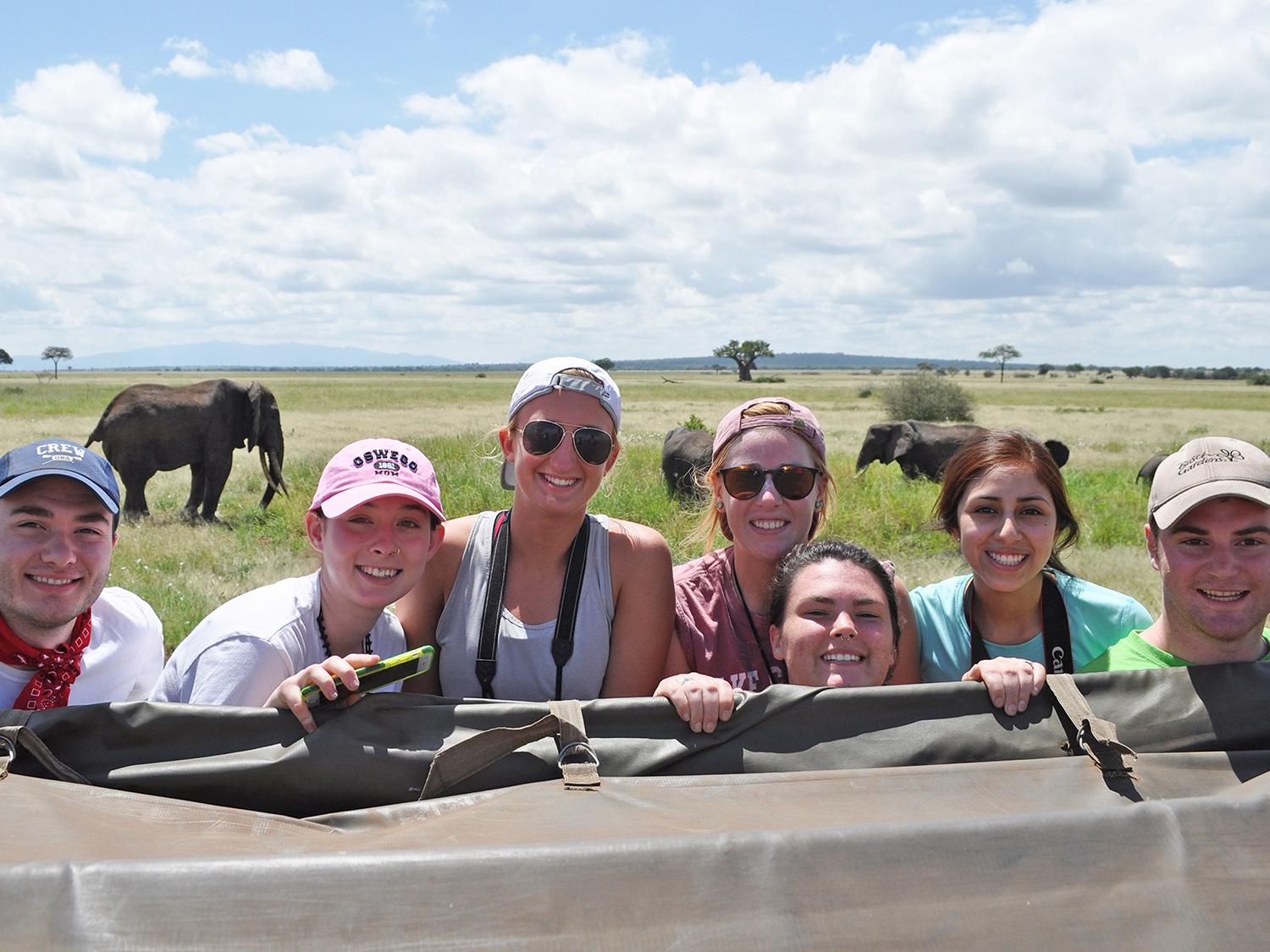'Life-changing experience' -- SUNY Oswego students beam during a trip through Tanzania's Tarangire National Park, where they observed wild elephants at a mud wallow as part of a study-and-travel opportunity that began in spring 2018 at the college and continued in May during a two-week trip to Eastern Africa. From left are Joe Rocco, Jessica Rice, Samantha Synan, Kari Laidlaw, Sarita Charap, Eileen Cacsire and Jonah Kieffer.
Giraffes and elephants grazing alongside cattle and goats. Lions lounging in acacia and sausage trees. Terrain as varied as Kilimanjaro's mountain, the Serengeti's plains and Lake Manyara's wetlands and woodlands. Elite, heavily armed "rhino rangers." Strict rules on human-wildlife contact.
For seven SUNY Oswego students and two biological sciences professors, a two-week study-travel experience in Tanzania in May provided revelation after revelation about how wildlife conservation and tourism management practices have impacted a land synonymous with a great diversity of species.
"I'd say it was amazing -- a life-changing experience," said senior zoology major Jessica Rice, who also minors in biocultural anthropology. "It revalidated all that I've put into my major and what I hope to do with my life."
"This has been something I've dreamed about since I was a little kid," said senior zoology major Jonah Kieffer, who also majors in operations management and information systems. "It was really an eye-opening experience in so many ways."
The trip with SUNY Oswego biological sciences faculty members Kamal Mohamed and Karen Sime was -- for Rice, Kieffer and their fellow students -- the culmination of a quarter course titled "International Studies: Tanzania Biodiversity and Conservation." The professors plan to offer it again in spring 2019, depending on enrollment.
Mohamed, a botanist, did research in 2016 on parasitic plants in the East African nation and visited the College of African Wildlife Management in Mweka. He learned the college offers lectures and discussions in advance of guided all-gear-included safaris to Tanzania's five national parks. Sime, an entomologist, co-developed and co-taught the course.
"We targeted zoology majors, many of whom have an interest in wildlife ecology, wildlife management and conservation," Sime said. "I also talked to one of Lisa Glidden's sustainability classes." But, Sime emphasized, the course is open to all majors.
Close encounters
Besides being an "official biodiversity hotspot" because of the variety of life present, said Sime, Tanzania in general and the College of African Wildlife Management in particular have become known for recruiting and training Africans in wildlife conservation and techniques for managing tourism.
"They have a lot of experience in the more than 50 years since the college was founded in mediating human-wildlife conflicts," Sime said. "It broadens our teaching of wildlife ecology here to find out how they do it there."
The class visited Olduvai Gorge, saw Mount Kilimanjaro and danced, jumped and ate with the Masai people in a village in the Ngorongoro Conservation Area. The highlight, according to Rice and Kieffer, was having close encounters with wildlife from the safety of a former Russian troop transport.
Kieffer, who has always loved elephants, said he got very excited when the group came across a pair of the massive mammals. "Don't worry, you'll see a lot more," said a guide. Not too long afterward, the group watched for an hour as 50 to 60 elephants visited a mud wallow. "It was just an awesome experience to see them come in and out," he said.
Mohamed said that during a daylong drive to the Serengeti, the group saw domestic animals grazing with wild ones -- cattle and goats sharing their turf with gazelles and giraffes and elephants.
Tanzania controls game hunting and the rules are strict, Mohamed said. No one, for example, is allowed to hunt rhinos, which are critically endangered and carefully repopulated to Tanzania's parks. Mohamed said that virtually all of the rangers come from the College of African Wildlife Management. The armed "rhino rangers" try to spot the animals every day; most are under camera surveillance. Conservation personnel even intercede with medical care for wounded or ill rhinos.
'Lifelong resources'
The trip to Tanzania "was really a course," Sime said. "There were two faculty members on the truck with us. They are highly qualified. Four others gave us PowerPoint lectures at the college. We sat in on a class lecture. All the faculty we met were African. … These are people who should be lifelong resources for our students."
Kieffer, who has interned for two summers at Busch Gardens in Williamsburg, Virginia, said he may return to Tanzania to take master's-level courses in Mweka toward his goal of theme park game management. Rice, who wants to combine veterinary pathology with wildlife management, said she would love to go again, perhaps as "an adult learner."
"It's incredible to meet the people there," Rice said. "They pride themselves on co-existing with all of these species of animals."
For more information on international study-and-travel opportunities, visit the SUNY Oswego Office of International Education and Programs site at oswego.edu/international. For more on the biological sciences department, visit oswego.edu/biology.




